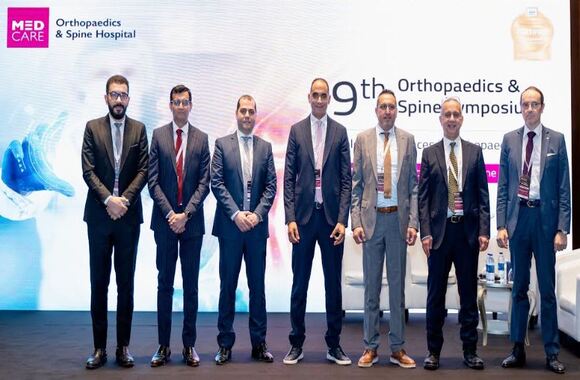Over 300 Orthopaedics & Sports Medicine experts from across the UAE gathered at the 9th Medcare Ortho & Spine Symposium held on Friday, 16th February 2024. Aimed to enhance patient experience and provide the best treatment outcomes, Medcare Orthopaedics & Spine symposium addressed the most recent advancements in medical technologies, surgical and treatment methodologies, and the use of Artificial Intelligence (AI) and robotics in complex orthopaedic and spine procedures. AI is looked upon as the major catalyst for revolutionary outcomes in orthpaedic patient care and sports medicine with multifold use of technology to evaluate diagnostic results, assess surgical procedures, track activities, predict injury risks, and a myriad of other applications, say experts.
Highlighting the emergence of advanced treatment and surgical solutions, Medcare Orthopaedics & Spine Hospital (MOSH) organized its ninth edition of Medcare Orthopaedics & Spine Symposium in Dubai, congregating fifteen seasoned key note speakers, who presented a range of topics and case studies exploring advances in orthopaedic surgical care.
Commenting on the conference, Dr. Shanila Laiju, Group CEO of Medcare Hospitals & Medical Centers in the UAE, said, 'Medcare envisions a future where cutting-edge medical innovation integrates with compassionate patient care. As technology and clinical advancements continue to redefine healthcare boundaries, we remain dedicated to implementing innovative solutions that harness the power of AI, virtual augmented reality, predictive analytics, alongside modern medicine and surgical techniques.”
Dr. Rahul Deshmukh, Medical Director at Medcare Orthopaedics & Spine Hospital added, “By embracing next-generation tools, we are not just delivering world-class complex care but also contributing to the transformative evolution of healthcare delivery. The Orthopaedics & Spine Symposium is our effort to ensure that we continue to elevate the overall standards of healthcare available in the country through knowledge sharing, collaboration and exchange of ideas,”
Dr Usama Haasan Saleh a Consultant Orthopaedic and Trauma Surgeon, touched upon calcific tendencies, which are the accumulation of calcium deposits in the tendons or ligaments of the rotator cuff muscles, usually caused by repetitive trauma or as a result of aging. Such conditions are treated through the latest minimally invasive techniques that assure accuracy and rapid recovery times.
The application of AI in spine surgery has emerged as a game-changer, says Dr Sameh Abolfotouh, Consultant Orthopaedic and Spine Surgeon at Medcare Orthpaedics & Spine Hospital,
“AI algorithms have been integrated into the planning process for surgical correction of spinal deformities. This technology contributes by providing surgeons with valuable insights and analysis of complex data. The use of AI enhances patient care by assisting in decision-making, optimizing surgical outcomes, and minimizing risks associated with complex spine deformities,” he added.
Dr. Sameh highlighted the role of robotic surgery as it significantly reduces the margin of human error, thereby minimizing invasiveness and enhancing patient safety. Through the incorporation of minimally invasive robotic surgeries, patients experience faster recovery times without encountering complications often associated with traditional surgical approaches.
Furthermore, Dr. Massimo Piracci, Consultant Orthopaedic Surgeon specializing in sports medicine at Medcare Orthopaedics & Spine Hospital, shed light on the risks of rare injuries and conditions (RICs) among athletes
“The evolving landscape of rehabilitation techniques for sports injuries, particularly emphasize the role of movement therapy. Unlike traditional approaches that rely on rest and immobilization, movement therapy adopts a comprehensive approach that leverages the body's inherent potential to heal itself through controlled and gradual movement. This technique aims to restore function, strength, and flexibility in athletes, marking a significant paradigm shift in sports injury rehabilitation,” he added.
Beyond discussions about the integration of AI algorithms in the surgical repair of spinal abnormalities, the symposium featured discussions on the most commonly seen orthopaedic conditions in the GCC. Other key topics included arthroscopic management, shoulder instability, robotics in arthroplasty, sports injuries, spinal cord tumours, lumbar degenerative disease, brain lab navigation, Achilles problems, foot and ankle sports injuries, hand fractures, flat foot treatment, transitional ankle fractures, and paediatric elbow trauma.
The line-up of expert presenters also included Dr. Amar Al Omar, Consultant Orthopaedic Surgeon with expertise in Orthopaedic Engineering; Dr. Ahmed Doheim, Consultant Paediatric Orthopaedic Surgeon; Dr. Maan Taba, Consultant Orthopaedic Surgeon; Dr. Azzam Fayyad, Consultant Orthopaedic Surgeon; Dr. Harpalsinh Jadeja, Consultant Orthopaedic Surgeon; Dr. Gopalakrishnan C V, Consultant Neuro & Spine Surgeon; Dr. Usama Hassan Saleh, Consultant Orthopaedic Surgeon; Dr. Khalid Al Awadi, Consultant Plastic Surgeon; Dr. Thaer Darwish, Consultant Neuro & Spine Surgeon; and Dr. Marc Sinclair, Consultant Paediatric Orthopaedic Surgeon & Dr Saher Arour, Consultant Vascular Surgeon.













